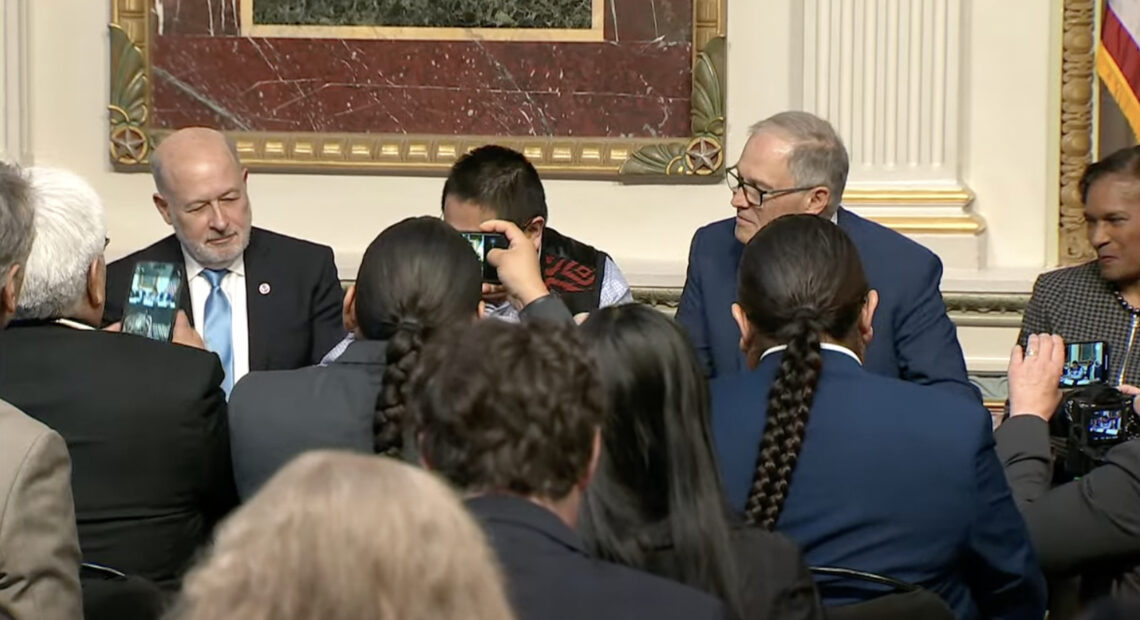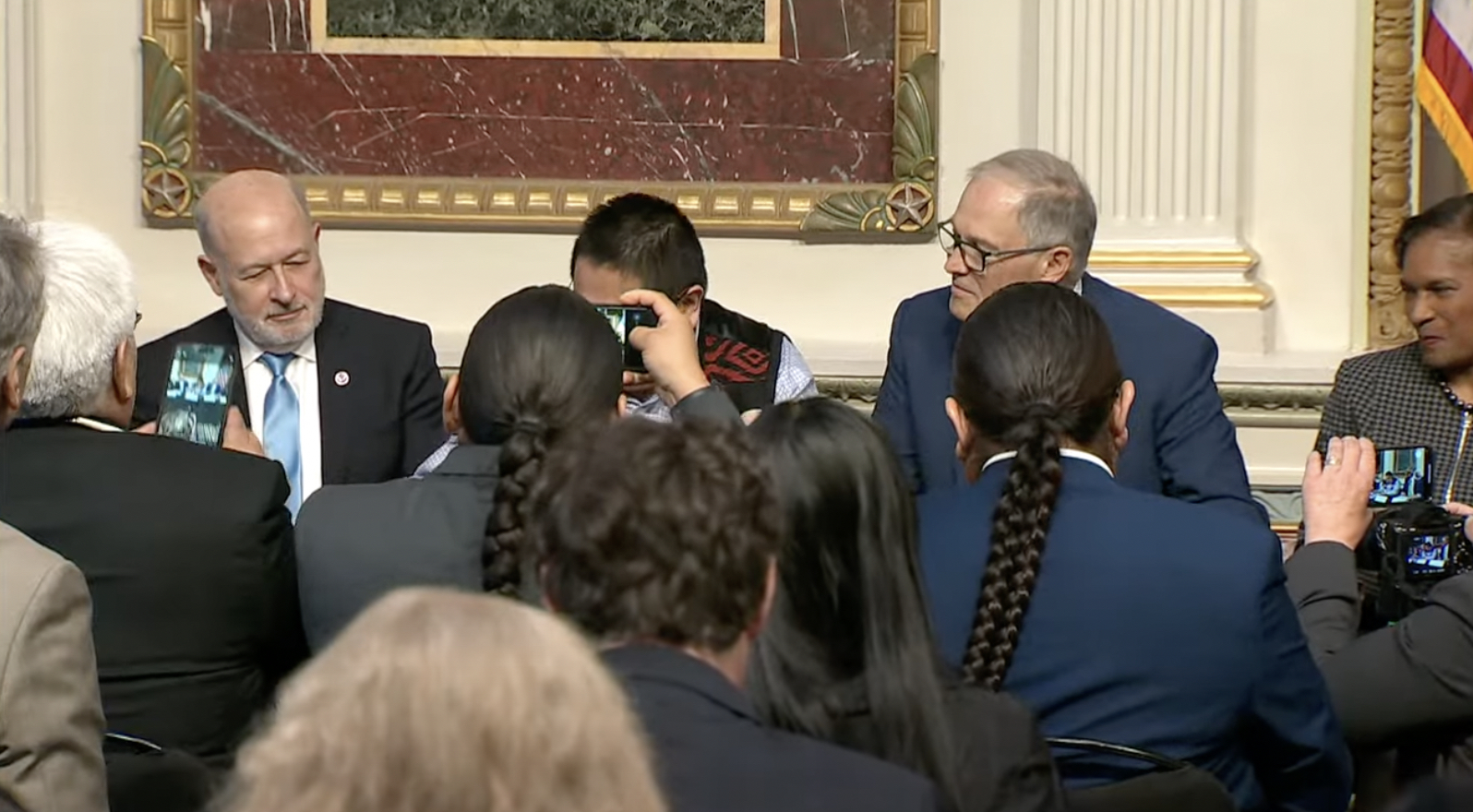
Tribes, governments sign historic agreement that’s a ‘path forward’ for salmon, dams
Listen
(Runtime 0:59)
Read
Cell phones and cameras popped above a packed room to capture the moment Friday each of six sovereigns – the Nez Perce, Yakama, Warm Springs and Umatilla Tribes and the governors of Washington and Oregon – signed the historic Columbia Basin Restoration Initiative, held securely in a maroon binder.
The hard-fought agreement put an end to decades of court cases over efforts to protect salmon and steelhead, while dealing with complex problems in the Northwest: energy transitions, irrigation and transportation.
This agreement, combined with other funding, will bring more than $1 billion to wild fish restoration and a 10-year break from court cases, according to the Biden administration.
The tribal, state and federal leaders officially signed the historic agreement Friday in Washington, D.C. Supporters say the plan will protect salmon and help ensure an environmentally-just future in the Northwest.
“When one side is being burdened, like we are with the lack of salmon in the system, then it’s our obligation to come to the other sovereigns and say, ‘Hey, what’s happened here is affecting our salmon runs and, therefore, our treaty rights. Therefore, we need to sit down and talk about how we can fix this,’” said Shannon Wheeler, Nez Perce Tribe Chairman.
An entire system shouldn’t burden one group, he said.
At the ceremony, Gerland Lewis, Chairman of the Confederated Tribes and Bands of the Yakama Nation, said this level of commitment from the federal government is unprecedented.
“Our fishers have empty nets and our homes have empty tables because, historically, the federal government has not done enough to mitigate these impacts,” Lewis said.
Treaties with the federal government ensure tribes have the right to fish in usual and accustomed places, forever. Since the dams were built, tribal leaders say the federal government hasn’t held up its end of the bargain.
“Now, we have an opportunity to do better and to have the tribes at the table,” Lewis said.
The work isn’t new, said Corinne Sams, Fish and Widlife Committee Chair for the Confederated Tribes of the Umatilla Indian Reservation.
“All we’re doing is collaborating and partnering, which we should have been doing all along,” Sams said.
Moreover, this agreement is “charting a new and exciting path,” said Brenda Mallory, Chair of the White House Council on Environmental Quality.
“We will find pathways to secure a better future for all the Northwest,” Mallory said.
A better future for tribes includes more salmon, said Jonathan Smith, Chair of the Confederated Tribes of the Warm Springs Reservation.
“We are working hard to improve the lives of our tribal members but it is difficult when the primary source of wealth – the natural resources of the Columbia River and the landscape – has been taken from us,” Smith said.
In December, the Biden Administration announced an agreement with tribes and the states of Oregon and Washington to restore healthy and abundant fish populations, grow tribal carbon-free energy projects and look into ways to replace the benefits provided by the four Lower Snake River dams.
Those benefits are numerous, from transportation upriver to Lewiston, irrigation to farmlands near the Tri-Cities, and carbon-free energy supplied by the dams.
However, the benefits have a cost, Wheeler said. Tribes and biologists say removing the four dams is one big action that needs to happen to keep wild salmon runs from extinction on the Snake.
“When you turn on your lights, when you charge your phone, when your heater goes on or your cooling system goes on, you don’t understand that what you’re doing is actually affecting salmon. We’ve just become accustomed to it,” said Wheeler.
Now, more than ever, Northwesterners need to come up with innovative ideas and solutions, he said.
Especially as the climate continues to change, salmon have a matter of years, not decades, said Collin O’Mara, president of the National Wildlife Federation.
“The politics are one thing,” O’Mara said. “But the science is always unforgiving. We have to make sure we’re acting according to the science.”
While the agreement didn’t ensure the removal of the dams, it is widely seen as a pathway to help understand how to do just that. Studies on replacing transportation, irrigation and energy benefits from the dams will help Congress make a decision on the fate of the Snake River dams.
However, several Congressmembers who represent districts where the dams are located have stood strong in keeping the four dams in place.
“The Biden Administration has crossed the line with its blatant, hypocritical assault on the Lower Snake River Dams,” said Rep. Dan Newhouse, R-Wash., in an earlier statement.
Over the last couple of years, a flood of reports and recommendations have supported breaching the four dams, as long as a plan is in place to help everyone that uses the services the dams provide.
In 2022, U.S. Sen. Patty Murray, D-Wash., and Washington Gov. Jay Inslee, also a Democrat, issued a report that found removing the dams would benefit fish – but it couldn’t be considered until people found a way to replace the dams’ benefits.
A federal report, from the National Ocean and Atmospheric Administration, the agency charged with managing threatened and endangered fish, released a month after the much anticipated Murray-Inslee report. It also recommended breaching the dams to save fish.
There has also been a growing chorus from tribal governments and their supporters. They’ve asked the federal government to uphold its end of treaty obligations that have been in place since 1855: for tribes to be able to fish in usual and accustomed places in perpetuity, which diminishing salmon returns have denied them.
Wheeler said the administration has listened.
Last September, the Biden administration released a memo directing all federal agencies to work towards “healthy and harvestable” salmon populations in the Columbia River System. That distinction would improve salmon numbers beyond being removed from the Endangered Species List.
Now, Wheeler said, it’s time for more candid conversations.
“We roll up our sleeves and, you know, we come together and, and we get to work,” Wheeler said. “We’d like to change things that are going to be positive for the future generations and fundamentally build those foundations. So that the future generations can make decisions without feeling the problems of the past that haven’t been corrected.”
















